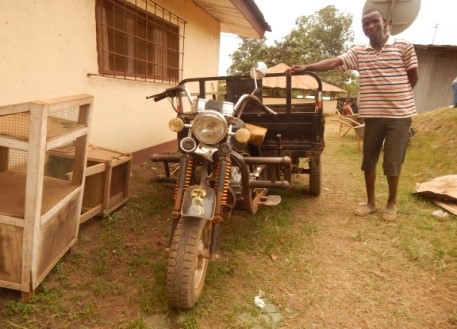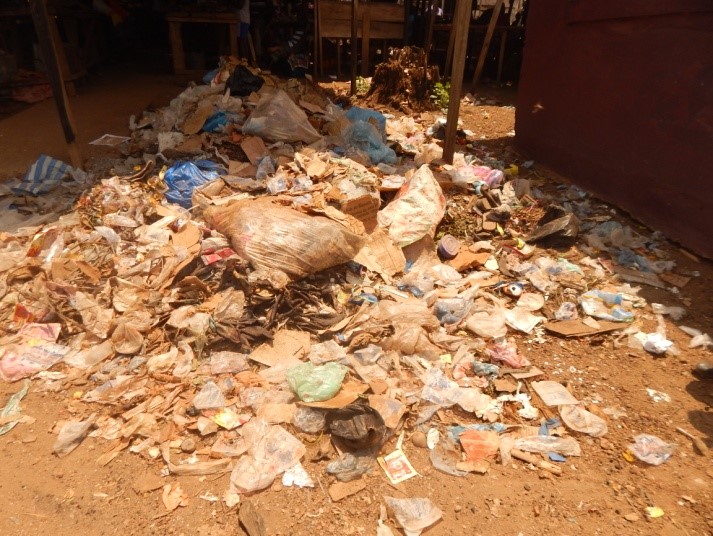GOMPA, Nimba – The city corporation in Gompa is blaming the city’s dirty streets on the lack of vehicles to transport garbage out of the city.
On any ordinary day, Gompa’s Main Street can be seen littered with trash. Emmanuel Paye, the administrative officer in Mayor Benjamin Dokpa’s office, said at the moment, Liberia’s second most populous city only has a single tricycle to remove garbage from around the city.
Paye, who was acting in the capacity of the mayor in the absence of Dokpa, said the Gompa City Corporation is seeking assistance from other municipal authorities in the country and the government of Liberia in meeting up with this challenge.
“Garbage collection at this time, because of the population in Ganta, stands to be a real constraint,” Paye said. “We only have one tricycle, and depending on the volume of garbage that is being collected from Ganta, the tricycle cannot afford to carry everything.”
The city dumps its trash at a location several miles away and the tricycle is the only means of doing so at the moment, he said.
“To get to that garbage pit, it takes us [a] long time because of the size of the tricycle,” Paye said.

The tricycle currently used by the Gompa City Corporation for garbage collection. Photo: Arrington Ballah
Paye maintained that despite the challenge, his office is exerting all efforts to keep the city clean and presentable.
He said the city had many volunteers who were ensuring that the city was regularly cleaned. Additionally, the city occasionally hires a dump truck to assist in hauling some of its garbage.
“Presently, we are doing our best to keep the city clean,” Paye explained. “We charter a truck almost every day to help the status of the tricycle… even as I speak to you, the truck is parked on the road now and removing garbage out of the main street.”
The city does not receive any assistance from the national government or the local county authority. Trash collection is made possible by taxes collected from local businesses.
“At present, I can assure you quite frankly that it is because of the businesses in Ganta that we are able to collect garbage because they are paying municipal taxes,†Paye said. “But when it comes to money being invested into Gompa City Corporation that is done to other cities around Liberia, it is not possible – government has not given any budget in order to augment Ganta’s status.”
Nimba has six cities with municipal authorities set up by the national government. Those cities include Gompa, Sanniquellie, Karnplay, Bahn, Saclepea, and Tappita. Only Sanniquellie, the seat of the county’s political head, benefits from subsidies from the national government.
At the last County Council Sitting in Sanniquellie, the final resolution passed had a provision for allotments to be made to city authorities of Nimba. US$15,000 was allocated to the Gompa City Corporation, but that amount is yet to be made available.
The local charter of the Liberia Marketing Association, the Ganta Market Association, also collects garbage in the city, although GMA mostly collects trash from near and around markets it controls.
Like the city corporation, GMA also lacks adequate equipment. Nearby communities take advantage of association’s negligence in removing its garbage and have been dumping on the piles of trash, increasing its volume.

Garbage is assembled on the streets near the Ganta General Market and later removed by GMA. Sometimes, marketers burn it when there are delays. Photo: Arrington Ballah
Alro Glay, inspector, and acting market superintendent said the fees collected from the market goes right back to the collection of garbage through the hiring of trucks to remove the garbage at least three times in a month.
“We are facing [a] serious problem in this market,” Glay said. “Every three weeks, we have to pay L$4,500 (US$41) for one load of garbage that the truck takes from here. All the little fees we collect from the market, we send some to the head office in Monrovia and the balance is what we use to pay for the garbage collection.”
Glay said if the government or the Liberia Marketing Association could provide the group with one dump truck, it would help in clearing the city’s streets of trash.
On the city’s main street, a major retailer who preferred to speak only under anonymity said she and other colleagues had been provided with a metal drum to use for garbage. Prior to that, she said garbage was dumped on the main street.
“Everyone has their own drum to put their garbage in and then GCC will come and collect it when it is full,” she said. “But before we could get the drum GCC gave us, we used to just park our garbage on the street.”
“For us here, we can put our dirt right to where you are seeing and when the people who can that the dirt with the wheelbarrow comes, we can put money together and give it to them – L$20 for one [load],” said Marthaline Seigne, a used clothes dealer at the Ganta General Market.
Even when the city controls the trash generated by businesses, it will need to focus on the behavior of its citizens. Along the main street, most of the trash seen littering on the sidewalks are left by individuals who may buy items such as sachets of water and dispose of the remnants in the street. The city needs to build a culture of environmentally conscious citizens.
Featured photo by Arrington Ballah




